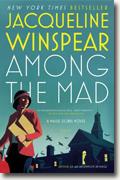Among the Mad
Jacqueline Winspear
book reviews:
· general fiction
· chick lit/romance
· sci-fi/fantasy
· graphic novels
· nonfiction
· audio books
· author interviews
· children's books @
curledupkids.com
· DVD reviews @
curledupdvd.com
newsletter
win books
buy online
links
home
for authors
& publishers
for reviewers

 |
Among the Mad (A Maisie Dobbs Novel) Jacqueline Winspear Picador Paperback 336 pages November 2009 |
|
In Among the Mad
Maisie innocently walks up to the lame man with his leg stretched out and reaches into her bag to offer money when the grenade explodes, shattering the calm of the winter’s morning. Saved by Billy and barely escaping with her life, Maisie remains haunted by the sense that someone saw her reach out to the doomed man and saw their eyes meet just before he pulled the pin that would ignite the grenade. In a soggy London that yields a gray light that makes the phrase “Merry Christmas” seem hardly worth saying, a much larger threat unexpectedly arrives at Home Security. A handwritten note, soiled by saliva and mentioning Maisie by name, demands that the government act immediately to alleviate the suffering of all unemployed, especially those who have served their country in wartime. The note also warns of a terrible disaster involving a lethal nerve agent if these demands are not met. Thrust into an unbearable reality, Maisie is seconded by the hotshot team at Scotland Yard - DI Richard Stratton, Special Branch’s Colm Darby, and DCI Robert MacPharlane - and asked to prepare a template of the perpetrator. When a sickening report comes in of a gas attack on a number of dogs in Battersea, Maisie is eventually led to the furtive events at Mulberry Point, the men of the Military Intelligence, the strange experiments of the staff and their overexposure to nerve agents. While the fate of a young soldier who participated in these experiments remains unknown, the perpetrator of the attacks seems eternally twisted in a grin of death, haunted by the silent scream of a man he laughed with just moments past: “A heartsick God had looked down and taken up a soul, leaving only the shell of a man.” Even after thirteen years, the war still ravages Winspear’s characters. The author spins a heavily atmospheric and multi-layered tale, her plucky heroine as determined and spirited as ever. Meanwhile, Winspear tells us much about the shocking and painful effects of war neurosis, neurasthenia and battle fatigue that's consumed a young soldier’s heart, enveloping him in hysteria along with thousands of other lost boys. While the novel retains all the traditional attributes of a deftly plotted historical mystery (with the goodwill and single-minded Maisie always at its core) there’s a deeper understanding at work here as the author digs deep into the mind and heart of a disenfranchised man abandoned, haunted, and tortured by the ghosts of the Great War. Originally published on Curled Up With A Good Book at www.curledup.com. © Michael Leonard, 2009 |
|
|
|
 Click here to learn more about this month's sponsor! |
|
| fiction · sf/f · comic books · nonfiction · audio newsletter · free book contest · buy books online review index · links · · authors & publishers reviewers |
|
| site by ELBO Computing Resources, Inc. | |
 Billy’s wife, Doreen, has
suffered from a terrible melancholia for over a year, unable to rise above the death of their daughter, Lizzie. With so much at stake and so much on their minds, the last thing Maisie and Billy need is to become the unwitting victims of a suicide bombing when a man begging on the street corner activates a hand grenade inside his
stained and tattered khaki coat.
Billy’s wife, Doreen, has
suffered from a terrible melancholia for over a year, unable to rise above the death of their daughter, Lizzie. With so much at stake and so much on their minds, the last thing Maisie and Billy need is to become the unwitting victims of a suicide bombing when a man begging on the street corner activates a hand grenade inside his
stained and tattered khaki coat.